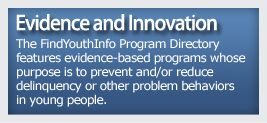Mentoring in Practice
Most mentoring occurs without the support of a formal program; however, the number of mentoring programs, as well as the number of adults and youth participating in formal mentoring relationships has grown substantially in recent years (MENTOR, 2006; Cavell, DuBois, Karcher, Keller, & Rhodes, 2009). To date, there are more than 5,000 mentoring programs that serve around three million youth within the United States. The majority of youth mentoring programs that occur in the United States are community-based programs that are run and staffed by practitioners (DuBois, Doolittle, Yates, Silverthorn, & Tebes, 2006) though site-based programs, especially school-based ones, are on the rise (Rhodes & DuBois, 2006).
According to a 2005 national survey (MENTOR, 2006):
- Three million adults participate in formal one-on-one mentoring with young people.
- The number of adults participating in formal one-on-one mentoring in 2005 was 19 percent higher than the number participating in 2002.
- Forty-four million Americans responded that they would seriously consider mentoring a young person.
-
The majority of adults participating in mentoring relationships with youth are willing to work with youth who are facing difficult life situations, including
- children of incarcerated parents,
- youth with disabilities, and
- immigrant youth.
While these statistics help illustrate the prevalence of mentoring throughout the country, they fail to capture the countless informal mentoring relationships that may impact young people on a daily basis. It is believed that many youth who participate in informal mentoring programs also benefit (DuBois, Doolittle, Yates, Silverthorn, & Tebes, 2006).
Cavell, T., DuBois, D., Karcher, M., Keller, T., & Rhodes, J. (2009). Strengthening mentoring opportunities for at-risk youth. Retrieved from http://www.mentoring.org/downloads/mentoring_1233.pdf (PDF, 4 pages)
DuBois, D. L., Doolittle, F, Yates, B. T., Silverthorn, N., Tebes, J. K. (2006). Research methodology and youth mentoring. Journal of Community Psychology, 34(6), 657-676.
MENTOR. (2006). Mentoring in America 2005: A snapshot of the current state of mentoring. Retrieved from http://www.mentoring.org/downloads/mentoring_333.pdf (PDF, 20 pages)
Rhodes, J. & DuBois, D. L. (2006) Understanding and facilitating youth mentoring. Social Policy Report: Giving Child and Youth Development Knowledge Away. Retrieved from http://www.srcd.org/sites/default/files/documents/20-3_youth_mentoring.pdf (PDF, 20 pages)
Youth Topics
Youth Voices
Feature Articles
Tools & Guides
Programs
Technical Assistance
Websites
Publications

- Mentoring in Practice
- Adults Who Act as Mentors
- Types of Mentoring Relationships
- Characteristics of Mentoring Relationships
- Benefits of Mentoring
- Challenges and Lessons Learned from Mentoring
- Successful Mentoring Relationships and Programs
- Starting a Mentoring Program
- Interagency Federal Support for Mentoring
- References

Announcements
Youth Topics

Map My Community is a tool designed specifically to assist you in locating resources in your community to help you build and strengthen your youth program. Get ideas for new partnerships, identify gaps in your community, and learn about resources to avoid duplication of effort.



















